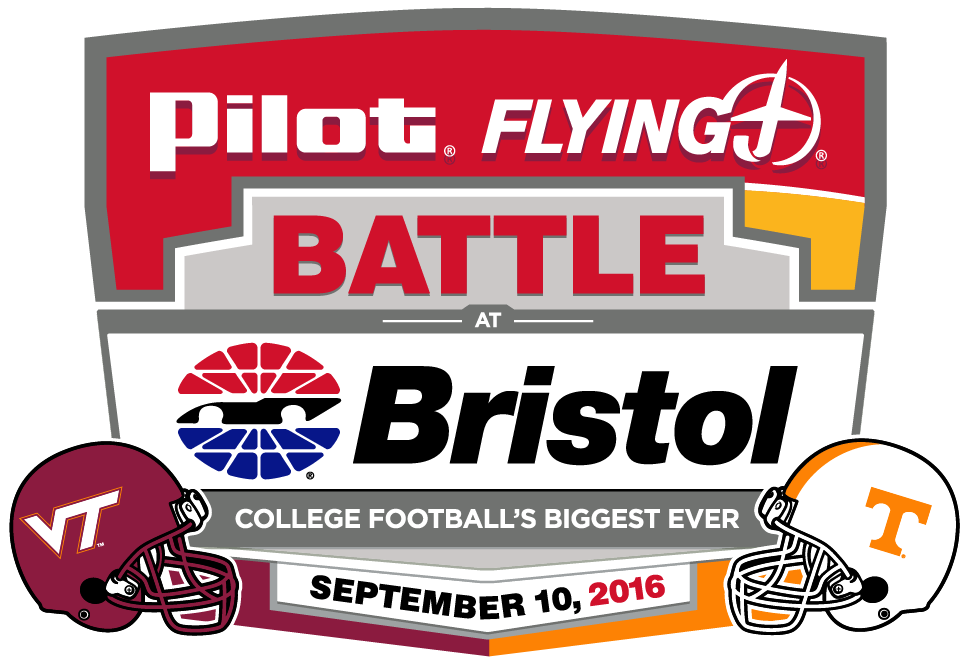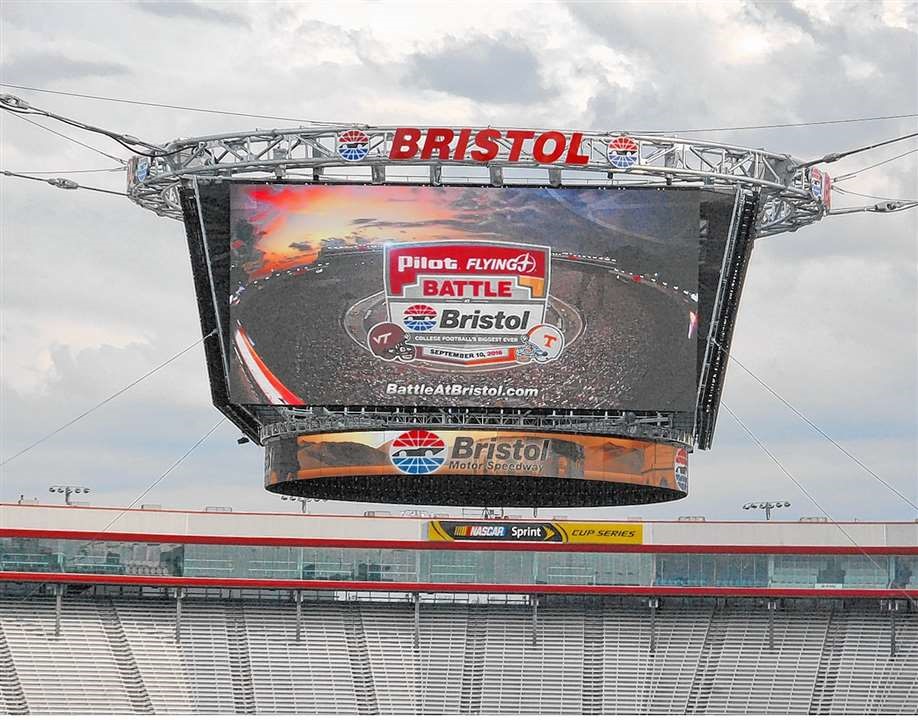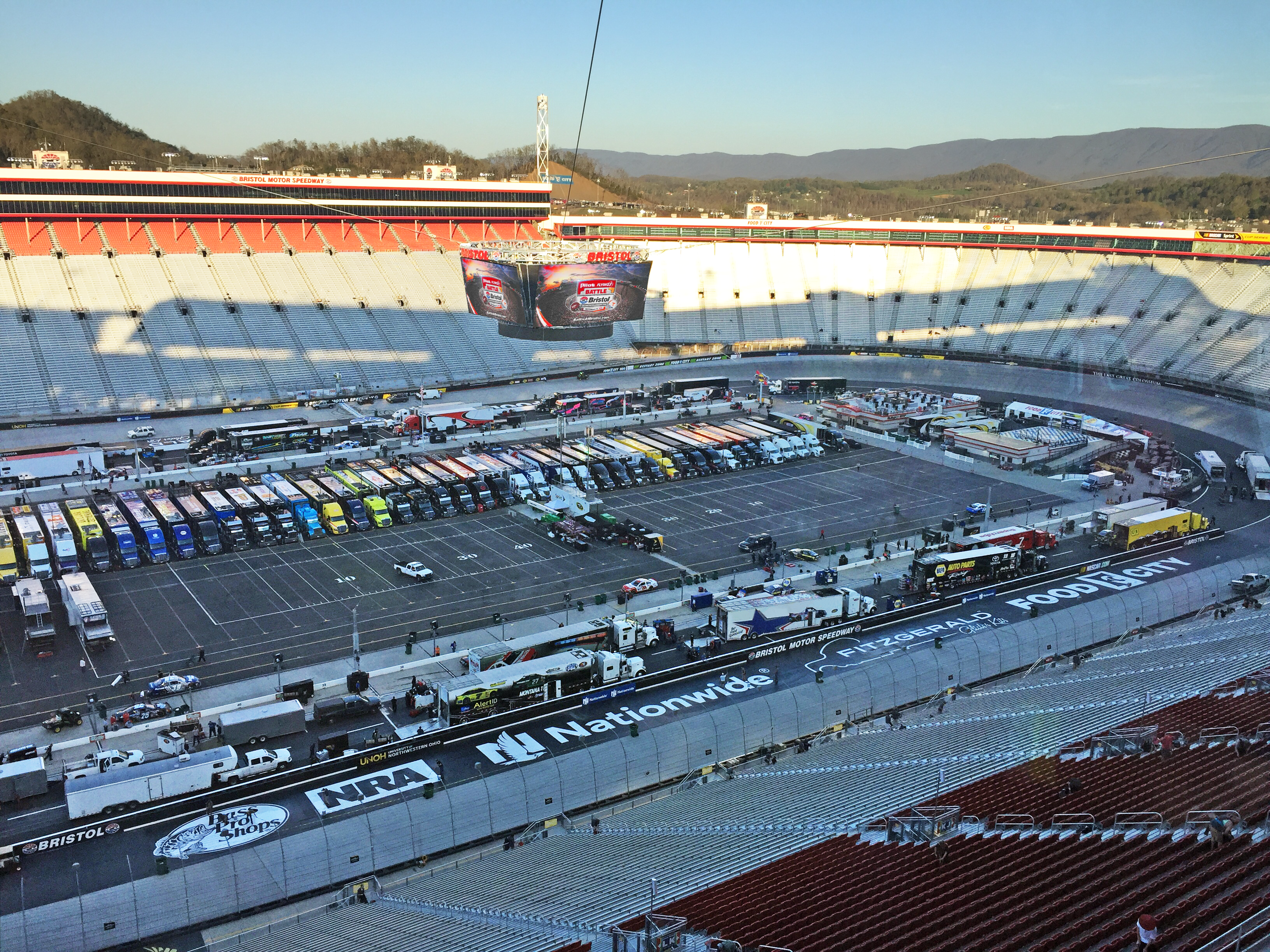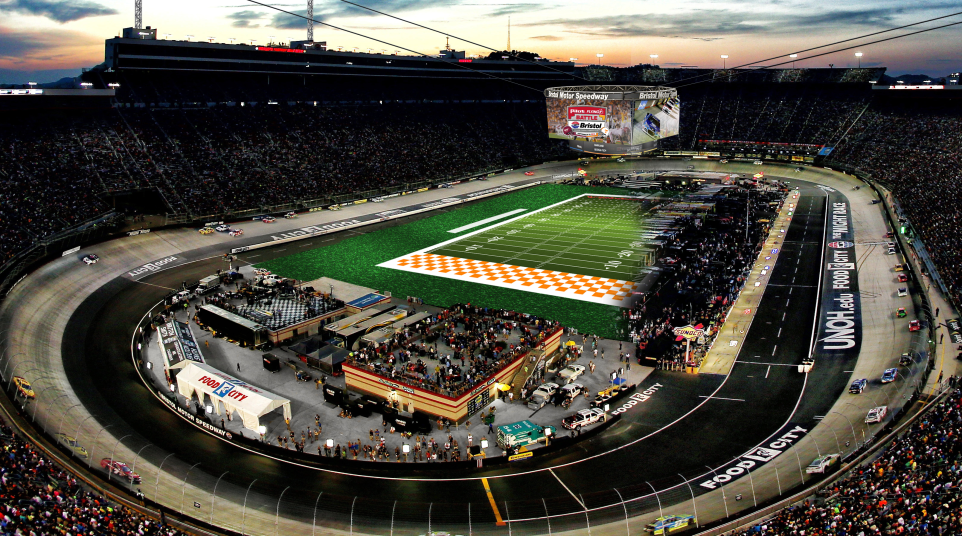How Bristol Motor Speedway will become college football's biggest colosseum
BRISTOL, Tenn. — Depending on exactly where you stand in the twin city of Bristol, you might be in Tennessee or Virginia.
About 110 miles to the West is Knoxville and the University of Tennessee. About 125 miles to the East is Blacksburg and the Virginia Polytechnic Institute and State University, better known as Virginia Tech.
The Volunteers initially started playing football in 1891. The Hokies took to the gridiron just one year later. However, despite their pigskin history and shared border, the schools have only played each other eight times — first in 1896, last in 2009 at the Chick-fil-A Bowl. The Vols lead the all-time series 5-3.
However, the ninth installment could be what transforms Tennessee-Virginia Tech into a legitimate rivalry.
After each program opens the 2016 regular season with the proverbial cupcake — Appalachian State for the Volunteers, Liberty for the Hokies — they will match up Sept. 10 in the Pilot Flying J Battle at Bristol.
Bristol Motor Speedway, a half-mile racetrack and the self-proclaimed “last great colosseum” on the NASCAR cicruit, will transform into a monster football stadium. With a capacity of about 150,000 and even more auxiliary seating in the works, the crowd is expected to be in the neighborhood of 160,000 for the game.
That would shatter the record of 115,109 set Sept. 7, 2013, when Michigan hosted Notre Dame in Ann Arbor.
“The Pilot Flying J Battle of Bristol has been many, many years in the making,” Tennessee coach Butch Jones told Saturday Down South. “I remember doing the first press conference, and now we are just months away from it actually happening.”
Said Hokies coach Justin Fuente: “I know Virginia Tech fans and Tennessee fans have wanted this game in this venue for a long time. We’ll keep our team focused on the game itself, but playing on the national stage in front of the biggest crowd ever is something we’ll embrace. Guys come to Virginia Tech to play in big games, and the Pilot Flying J Battle at Bristol will be big on a number of different levels.”
The game was originally the brainchild of Bruton Smith, the billionaire CEO of Speedway Motorsports. Bristol is one of eight NASCAR tracks he owns. It took about two decades for his vision to become reality.
“Our players, staff and fans are extremely excited to be a part of this unique event,” Jones said. “The opportunity for us to showcase our football program in front of 150,000-plus fans is going to be special. It’s the first of its kind, and we can’t wait to get there.”
Pilot Flying J was a natural fit as the title sponsor. Its CEO, Jimmy Haslam, has football in his blood. Not only is he currently the majority owner of the Cleveland Browns, but his father, Pilot founder Jim, was a team captain at Tennessee. He was part of a Volunteers squad that won the national title in 1951.
Back when Smith concocted his plan, Tennessee and Virginia Tech were among the country’s powerhouses.
The Volunteers upset Florida State in the inaugural BCS Championship Game in 1998. The following year, the Hokies led FSU in the title game — Michael Vick was electrifying — before fading in the fourth quarter.
SETTING THE STAGE … ER, TRACK
Flash forward to Oct. 14, 2013, when this spectacle was finally unveiled: Tennessee was in the middle of its third straight 5-7 campaign. Virginia Tech’s streak of eight consecutive 10-win seasons had ended in 2011. Coaching turnover was hampering the Vols. The Hokies struggled in the twilight of Frank Beamer’s career.
Fortunately for everyone involved, there are reasons to be optimistic in Knoxville and Blacksburg again.
Tennessee will be the SEC Media Days pick to capture the SEC East, as Jones and Co. are primed after a 9-4 year. Dual-threat quarterback Joshua Dobbs and hard-charging running back Jalen Hurd can be Heisman Trophy candidates.
As for Virginia Tech, Beamer stepped aside after a 7-6 season and a victory over Tulsa in the Independence Bowl. His 238 wins tie him with Mack Brown for ninth in college football lore. Taking over is Fuente, the 39-year-old who won 19 games in his final two years at Memphis. He was considered a home-run hire.

Chances are high that ESPN will bring College GameDay to Bristol, making a big event so much bigger.
Bristol is a Volunteer town for the most part — anywhere from 2-to-1 to 3-to-1 over the Hokies depending on whom you ask. But there is plenty of maroon to be found among the locals. There is no orange monopoly.
Expect a relatively even split among the crowd at Bristol Motor Speedway, as each school has been allotted 40,000 tickets. The Tennessee and Virginia Tech fan bases tend to travel well. Just ask the aforementioned Seminoles. FSU supporters were severely outnumbered at both of those national title games.
The Vols are no strangers to gigantic crowds, as Neyland Stadium has packed in as many 109,061 spectators.
Lane Stadium may be lacking in size — 65,632 is a full house — but makes up for it with fanaticism. The student section doing the “Blacksburg Bounce” while Metallica’s “Enter Sandman” plays is a rite of autumn.
“We have a lot of respect for the Virginia Tech program, and we understand the challenge ahead of us,” Jones said. “I know it’s going to be a fun event for both schools.”
Said Fuente: “Tennessee will be a tough opponent. They’re a preseason top 10 or top 25 team according to a lot of folks.”
If there is one thing that college football and NASCAR have in common, aside from each respective sport’s most fervent fans residing in the South, it’s tailgating. NASCAR in particular is known to have revelers park and party for days at a time. Expect the campers to start rolling in to BMS way, way before kickoff, spreading out among the large swath of land that surrounds the racetrack.
There is little doubt in the football community that Bristol Motor Speedway will put on a terrific affair.
“I sleep well knowing that we have a great, experienced team in place at BMS,” said Jerry Caldwell, the general manager of Bristol Motor Speedway. “Like any promoter, you always keep learning and look at ways to enhance our guests’ experience for any event we host, be that traffic flow or new options and great service at our concessions stands.”
Expect a concert the night before. Expect luxury suites overflowing with food, booze and flat screens. And expect a NASCAR influence, all of it designed to separate fans from their money as many ways as possible.
LOGISTICS PUZZLE
The execution of the actual game — after all the pomp and circumstance is complete and we’re ready for kickoff — still features some unanswered questions. Where does the play clock go? How do assistant coaches in the press box get to the locker room and back? Can the playing surface be trusted?

From a visual perspective, as opposed to scoreboards in each end zone, Colossus will hover above midfield.
Colossus is a four-sided video hub weighing approximately 700 tons and featuring a quartet of screens — each measuring approximately 63 feet wide by 30 feet high — supported by cables thicker than a linebacker’s forearm.
The BMS website claims a screen resolution of 18 million pixels “grouped tighter than the large-scale outdoor displays in Times Square” and color combinations “23 times brighter and 25 percent sharper than the typical home HD TV.”
In addition to giving instant replays, Colossus will double as a scoreboard providing the important info for a football contest: game clock, down and distance, timeouts and more. It hangs high enough so as not to affect the kicking game.
But the rest of the metamorphosis from half-mile racetrack to regulation football field is yet to begin.
“We have been discussing the logistics and details of this game for a couple years now,” Jones said. “Our facility staff has been working closely with the crew at Bristol to make sure everything is covered. It’s a process that will be ongoing all the way up to kickoff. It’s not easy to put on a game of this magnitude and will take a lot of work behind the scenes to make it happen.”
Said Fuente: “Our football operations and equipment crews have both been down there to take a look at the logistics. Both teams are going to be dealing with the same challenges.”
The Bass Pro Shops NRA Night Race is scheduled to be run Saturday, Aug. 20, meaning Bristol Motor Speedway only has three weeks to go from NASCAR caterpillar to college-football butterfly. It’s going to be tight.
For instance, locker rooms essentially have to be built from scratch. Tennessee’s is sitting under Victory Lane right now. Virginia Tech’s is presently an area housing wheels and tires on a conventional race day. If an injured player needs an X-ray, he may have to go to a nearby hospital — BMS can’t do them on site.
Lines, numbers and hash marks have already been spray-painted on the asphalt along the racetrack infield.

After the race, countless trucks must dump loads full of gravel. That gravel has to be leveled to raise the surface a few feet. Then synthetic turf — natural grass posed too many possible problems — will be laid.
This can’t be all sizzle. There’s got to be some steak, too. A historic crowd will go home disappointed if they watch a slow taffy pull. If, say, there are half a dozen delay-of-game flags because the quarterbacks can’t see the play clock, the end result could be a one-time gimmick never attempted again.
Myriad other challenges remain — including some that may not be fully figured out until game day arrives.
Because several of the offensive and defensive coaches will be up in the press box instead of down on the sideline, herding them to the locker room and back during halftime may require golf carts and an escort.
Fortunately, their vantage point for the game should be totally fine. The stadium seating at BMS is built rather vertically. As a result, the boxes aren’t that much further from the field than they would be at a traditional venue. Coaches shouldn’t have any issues when it comes to identifying personnel and coverages.
“Will the assistant coaches be a little further away than usual? Probably so,” Jones said. “But we have no complaints. They have a detailed plan to get the playing surface in following the final race, and we’re confident everything will go as scheduled.”
“We’ll tell our assistants in the booth to bring a good set of binoculars,” said Fuente. “But in terms of the playing surface, we have every confidence that it will be as good or better than any turf we play on this season.”
There will actually be two football games played on back-to-back Saturdays at BMS, as opposed to just one.
Although it won’t be nearly as extravagant as Tennessee-Virginia Tech the week prior, East Tennessee State and Western Carolina — a pair of fortunate FCS teams — are scheduled for their own border war Sept. 17.
VENUE, EVENT HARD TO DUPLICATE
Bristol Motor Speedway is the lone facility on the NASCAR circuit capable of making a function like this happen. Martinsville Speedway in Ridgeway, Va., and Eldora Speedway in New Weston, Ohio, are the only other half-milers on the circuit — anything bigger would have fans sitting too far away from the action.
Neither offers continuous stadium-like seating. Capacity at Martinsville is 55,000. Eldora? Just 17,905.
BMS is already one of the most popular racetracks among NASCAR devotees. Noise can be deafening. Banking in the turns — as much as 30 degrees — can be treacherous. A green-flag lap takes less than 15 seconds.
But the future of Bristol Motor Speedway outside the world of motorsports hinges on the success or failure of Volunteers-Hokies. If the Pilot Flying J Battle at Bristol comes off without a hitch, imagine the possibilities. While BMS officials won’t speculate on record, conversations have taken place behind closed doors.
Maybe a bowl game. Perhaps a World Cup qualifier. Preseason NFL anyone? Titans vs. Panthers is appetizing.
“Even though it is our first college football game, the talent of our Bristol team will provide first-class facilities for all of the participants and our guests,” said Greg Harvey, Bristol Motor Speedway’s vice president of corporate sales. “This will also be an opportunity for us to showcase our venue to others in the sports and entertainment industry so that Bristol can grow and host even more world-class events.”
One step at a time, though. No matter how well Tennessee vs. Virginia Tech goes, there are no plans for an annual neutral-site arrangement like Florida-Georgia. They would be delighted with once every three years.
“As a head coach, you are involved in some of these conversations,” Jones said. “But you also trust the people doing the work. We know everything will be in place, and it’s going to be a unique experience for all parties involved.”
The timing is perfect for a potential new tradition. The Volunteers are on the rise. The Hokies are pumping fresh blood. The Week 2 slate is chock full of sure blowouts, like Western Kentucky at Alabama and Troy at Clemson. Kickoff won’t be determined for a while, but prime time seems like a foregone conclusion.
Another one: Destroying that single-game attendance mark by a gap of about 40 percent.
According to Caldwell, there are more requests than tickets at the moment. He has been referring to BMS as “a football stadium on steriods” ahead of the occasion.
Even if holding the Pilot Flying J Battle at Bristol every year would be biting off more than everyone can chew, both the Volunteers and Hokies could use an upgrade when it comes to Rivalry Week in late November. Tennessee-Vanderbilt doesn’t command a lot of attention these days. Neither does Virginia-Virginia Tech.
A three-year cycle of Knoxville, Blacksburg and Bristol could make Volunteers-Hokies an instant classic.

